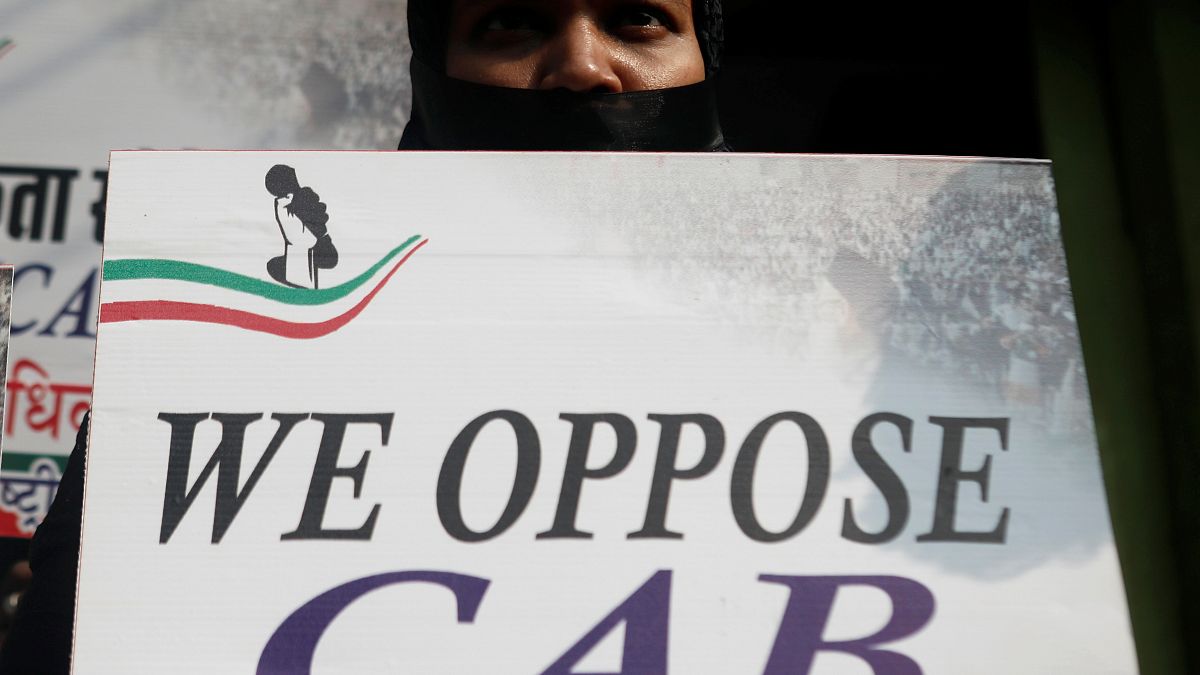Euronews looks at the bill and the controversies surrounding it as protests rage in the South Asian nation.
India's upper house of parliament passed a bill on Wednesday to give citizenship to religious minorities persecuted in neighbouring Muslim countries.
It is the first time that the country is seeking to grant nationality on the basis of religion.
The law, which many coined as 'anti-muslim,' sparked widespread criticism and violent protests, particularly in the northeastern Assam state.
Prime Minister Narendra Modi's Hindu nationalist government has said the so-called Citizenship Amendment Bill was meant to protect besieged minorities.
But critics say it undermines the country's secular constitution by not offering protection to Muslims while others argue it will open India's northern states to a flood of foreigners.
Euronews looks at the bill and the controversies surrounding it as protests rage in the South Asian nation.
What's in the bill?
The Citizenship Amendment Bill (CAB) amends a 1955 citizenship act prohibiting illegal immigrants from becoming citizens.
It stipulates that "any person belonging to Hindu, Sikh, Buddhist, Jain, Parsi or Christian community from Afghanistan, Bangladesh or Pakistan, who entered into India on or before the 31st day of December, 2014 (...) shall not be treated as illegal migrant for the purposes of this Act."
For these migrants, the requirement of residence in India for citizenship by naturalisation will be relaxed from 11 years to 5 years.
Islam is not mentioned among the faiths listed by the bill.
Why is it controversial?
The Indian Express newspaper ran an unsigned editorial saying that the law unfairly targeted India's 170 million Muslims.
"It is a political signal of a terrible narrowing, a chilling exclusion, directed at India's own largest minority. India is to be redefined as the natural home of Hindus, it says to India's Muslims. And that they must, therefore, be content with a less natural citizenship," it read.
The bill was also criticised abroad, including by the US Commission on International Religious Freedom, an entity under the US Congress, which recommended sanctions,
"The CAB is a dangerous turn in the wrong direction; it runs counter to India’s rich history of secular pluralism and the Indian Constitution, which guarantees equality before the law regardless of faith."
But on Twitter, President Modi hailed the passage of the bill and said it was in line with "India’s centuries-old ethos of assimilation and belief in humanitarian values."
Other critiques are motivated by the fear of immigration, particularly in Assam state, where a movement against illegal immigrants from its neighbouring Bangladesh has simmered for decades.
"This a spontaneous public outburst," said Nehal Jain, a masters student in communications in Guwahati. "First they tell us there are too many illegal immigrants and we need to get rid of them. Then they bring in this law that would allow citizenship to immigrants," she said.
The Prime Minister tried to reassure Assam residents on Twitter.
What's next?
The CAB now only requires Presidential assent to become law.
The government has said the new law will be followed by a citizenship register that means Muslims must prove they were original residents of India and not refugees from these three countries, potentially rendering some of them stateless.
In August, a new national Register of Citizens (NRC) in Assam left nearly 2 million people off the list, with their fate uncertain.
Aman Wadud, a human rights lawyer for illegal immigrants in Assam, told Euronews that the Assam model of register was to be extended to the rest of the country.
"Now in the proposed nationwide NRC, this Assam model will be replicated all over India and millions of people will be made stateless, that is the basic intention of the citizenship amendment bill."
"This bill is not to protect non-muslim illegal migrants from Bangladesh, Pakistan or Afghanistan but rather to target Indian Muslim, Indian genuine Muslims, " Wadud said.
